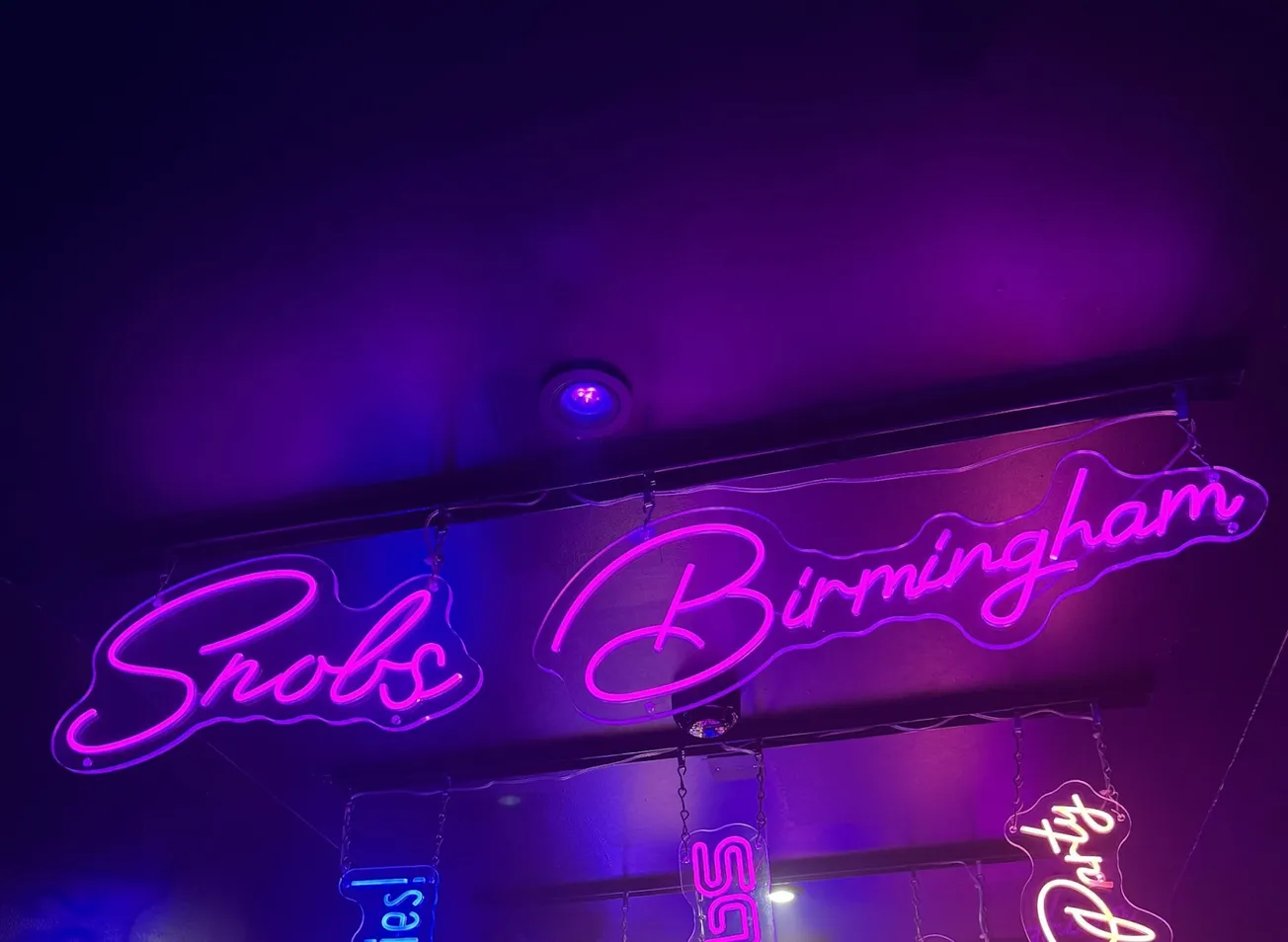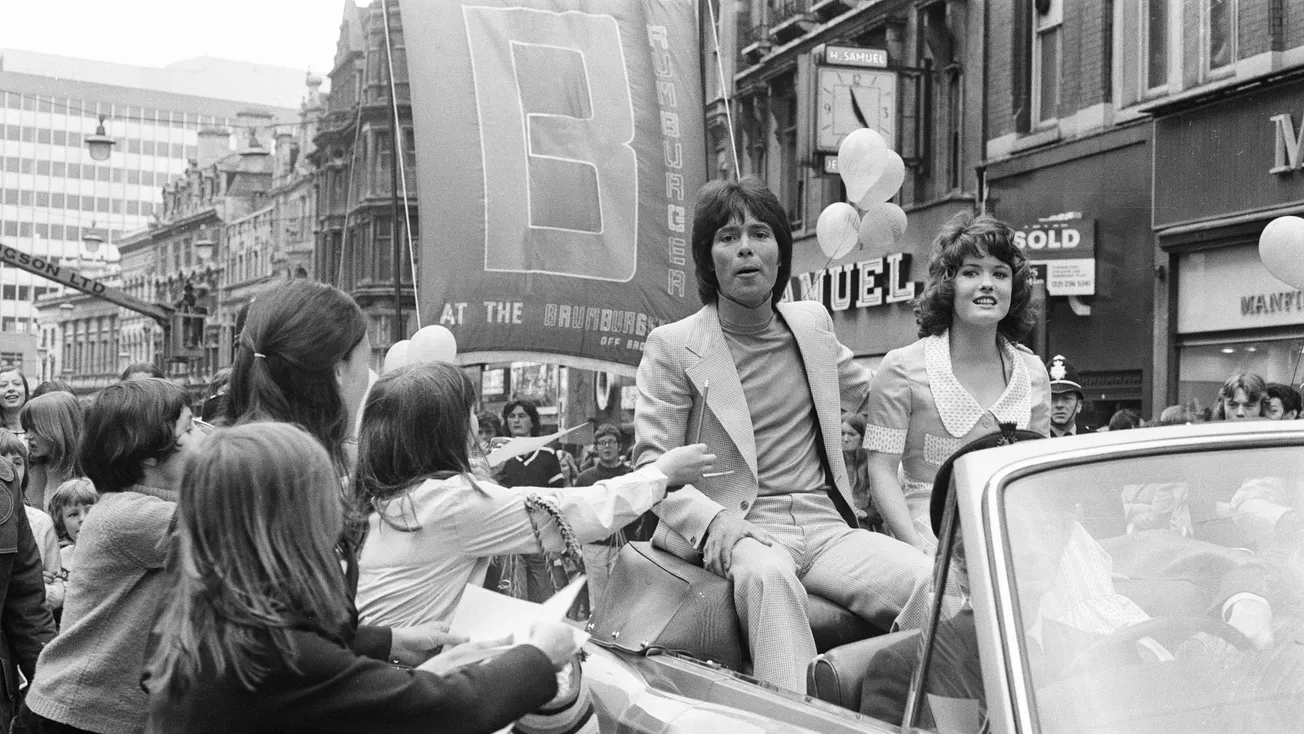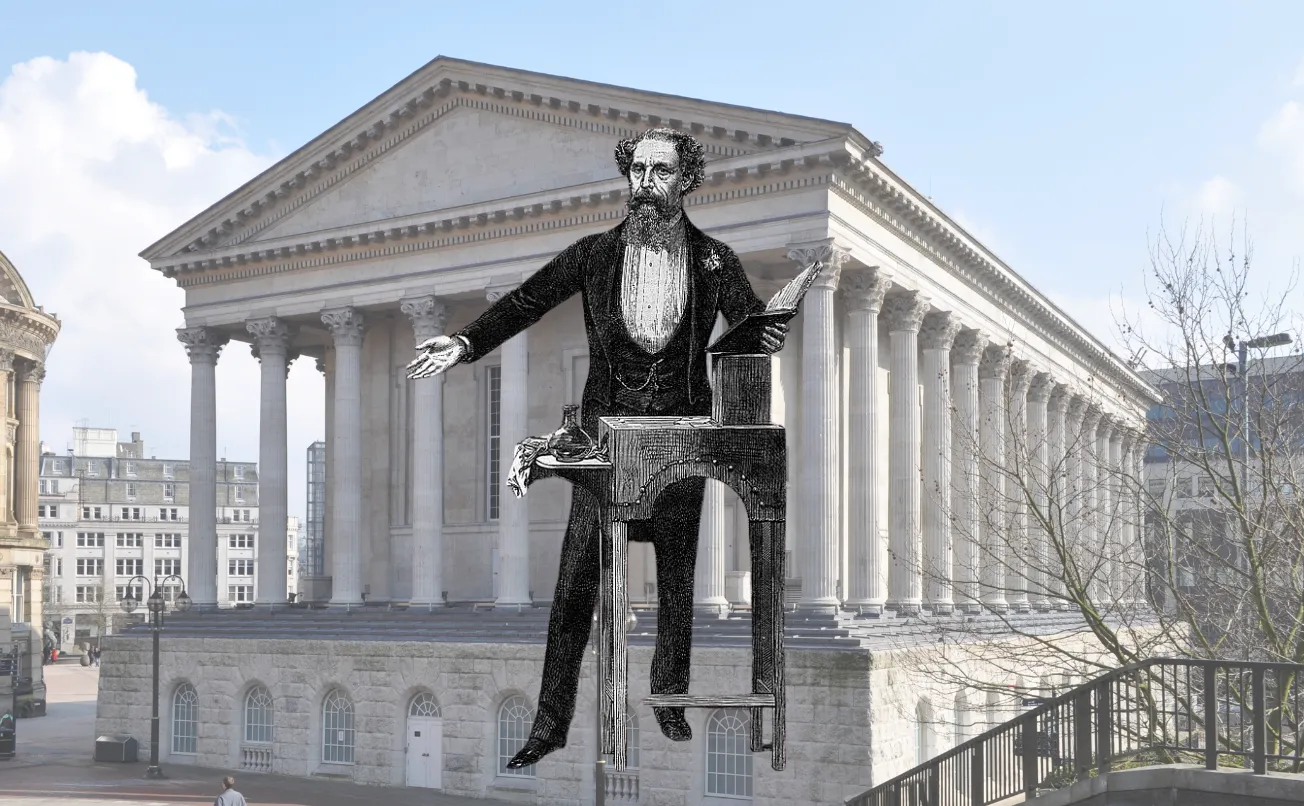By Anya Ryan

Rewind to the early hours of 22 September 2014. I’m sitting on the edge of the pavement on Paradise Circus, clutching a cone of soggy chips, surrounded by a sea of familiar faces for what will be the final time. This is the standard routine after a night out at Snobs — Birmingham’s oldest club, which has stood in this iconic location since 1972. That is, until tonight. Like hundreds of others, I’m here to bid farewell to Snobs’ original home. People are crying, hugging and taking pictures in front of the famous, fading yellow sign. Going to Snobs is a rite of passage in this city, after all.
Like so many other Brummy teens, Snobs was the first club I ever went to and then religiously attended week-on-week. The drinks were shockingly cheap. The indie music they blasted ran on an almost identical playlist every night. Everyone knew everyone. This didn’t make us exceptional: the generations above us all had their own Snobs stories, too. Snobs was like entering a sweaty time capsule; here, we were part of history.
For years before that night, rumours had swirled that the club was in crisis. The roof was falling in, some said. Snobs had had one too many noise complaints, others believed. The reality was that the building was being turned into apartments, confirms Wayne Tracey, who has been Snobs’ owner since 2002. “With no investment, we would have been turfed out eventually. We had no other option but to go,” Tracey says.
Tracey secured Snobs a second life in a bigger, more glitzy venue on the corner of Smallbrook Queensway, which opened less than a week later in September 2014 — a place that affectionately became termed ‘New Snobs’. Despite an initial frosty reception, the club thrived here, even through Covid.
But now Tracey’s nightmare has happened for a second time. At a public meeting in February 2024, it was confirmed that New Snobs was being converted into apartments, in line with plans for HS2. “We knew it was coming,” says Tracey. “I got to my lowest point. I thought Snobs might be over.”
Snobs first opened its doors in 1972 and has been part of Birmingham’s nightlife scene for 52 years. Founded by the Birmingham-born Berrow Brothers — Paul, Michael and Terence — who already owned the New Romantic club Rum Runner on Broad Street, Snobs burst onto the scene, dressed in Doctor Who-inspired decorations, including the now famous wall of faces, and playing soul, reggae, disco and blues. But unlike the Berrow Brothers’ other venue, Snobs persisted to the present day. Chris Carter-Jones, a 65-year-old hairdresser living in Harborne, was at the opening night of Snobs back in 1972. “I was 22, it was amazing, it felt special,” he says. “It was the first club I ever went to where everyone just got on… now I brag to my friends’ kids that I was there, right at the start.”
The Snobs I went to was rundown and grotty, but back then it was sparkling new. The floors were run with thick carpet and people would dress up to look their best for a night out there. It was even considered fancy. Carter-Jones tells me stories of people boasting that they’d been to Snobs the night before, and the competitions that the venue staff ran for the most unusual hairstyles (“My client won once. We were out on the lash!”). Glamour was central to the club’s identity.
In 1980, the Berrow Brothers parted ways. Paul and Michael left to manage a newly formed band called Duran Duran, while Terence chose to stay with Snobs. “The rest is history,” says Tracey. Even in the early days, Snobs was recognised in Birmingham as a temple of tolerance. Many recall an open-door policy, where no one was turned away unless totally inebriated. Carter-Jones speaks fondly of Snobs’ inclusivity— he doesn’t recall a single instance of homophobia or racism, which was uncommon in Birmingham at the time.
The Berrow era came to an end in “around 1998”, when the club passed into the ownership of Gary Daniels — an apprentice, of sorts, of Terence. Daniels had already climbed the ranks at Rum Runner, proving his worth to the Berrows. But, his takeover at Snobs signified a new age. Dance music ruled the club scene at the time, but indie was on the rise too, so Daniels decided to do something out of the ordinary: he transformed Snobs’ main room in the club into a grunge and Britpop-influenced paradise, with the likes of Oasis, Pulp and Muse on constant rotation. The smaller room became a tribute to the 60s; the sounds of funk and soul blared.
Daniels died in 2001, aged just 40, while he was still running Snobs, but his changes to the music were the beginnings of the Snobs we know today. “When Gary took over, I think it would be fair to say that Snobs was pretty much on its knees,” says DJ Mark Wilson. Before he started working at Snobs in the 90s, Wilson regularly attended as a punter, and says that indie was practically unheard of — disco was the sound of the place. “The key to Snobs’ resurgence was doing something different,” he says.

From 2002, Snobs was Tracey’s, and with his succession came a lot of opinions. He was told by many to leave the Daniels’ indie years behind and push Snobs into being something fresh. “But I thought, why fix something that is not broken?” he says. Until its closure, Old Snobs kept the larger room for indie and the smaller room for older tunes.
As the years went on, the pristine look of the early days gradually disappeared. The 70s design stayed but looked more shabby; the floors became so sticky you’d be a fool to wear anything but your worst pair of shoes. It was under-resourced and falling apart around us. You could spend hours queuing for the cloakroom or a drink. But none of that mattered. At Snobs, you were surrounded by people that, for one night at least, felt like family.
But Snobs’ scrappy period is no more. I meet Tracey on a Monday morning, inside Snobs’ third home — Newest Snobs, if you will. After a deal for a space in Digbeth fell through, Tracey lost hope for Snobs’ future. Luckily, a venue on Broad Street came up just in time. “I did the deal very, very quickly,” he tells me. “My head was telling me to pack it all in but my heart was telling me I couldn’t… Snobs is bigger than me. It’s too important to this city.”
This may be marketing speak, but almost everyone I talk to for this piece has glowingly positive memories of their Snobs years. “It was a general entry into adulthood,” says Bela Gardner, a 28-year-old Harborne resident who at points was attending Snobs weekly. “The music was shit but singalongable, there were cheap drinks, Snobs was always exciting… you saw so many people you knew.”

In Birmingham, Snobs devotion runs deep. For people who grew up here, your first Snobs was a baptism into your adult years. Even when some of us left the city for pastures new, it remained a place of reunion. On the last Wednesday before Christmas, Snobs would be swarming with people. ‘Christmas Snobs’, as it was fondly known, was an annual highlight. One year, the toilets flooded so badly, we were essentially dancing in water. It was almost impossible to even reach the smoking area. “It was iconic, the whole club ended the night with The Pogues, all joined arm in arm,” remembers 31-year-old Sarah Baghdadi. “My happiest club memories were in Snobs and always will be.”
Snobs felt eternal. “My nan went to Snobs,” says 28-year-old Isobel Haydock, who also went to both Old Snobs and New Snobs weekly for years. 31-year-old Sam Newton, who lived in Harborne during his teens, concurs: “The legacy of it was enormous, the fact that three generations of a family could have memories there.” But its everlasting quality made many of us reluctant to accept any development. After its move to Smallbrook Queensway, many staunch Old Snobs fans — myself included — turned our noses up at the swanky bars, vaster dance floors and functioning toilets. It’s not the same, we chorused. “A shred of the original atmosphere was in the second one… the magic was lost,” Newton says.
When I first entered New Snobs back in 2014, I was shocked by the difference. It could house up to 1,400 people (more than twice its predecessor), it had air conditioning, and there was a bar attached that screened sports in the daytime. Despite the design being heavily influenced by the 70s decor of the original club, it felt weirdly shiny and new. “It was pretty sad leaving Paradise,” says Ross Nicholls, Snobs’ current Operations Manager. “It was hard. The venue was so iconic and people’s feelings about it were so visceral.”
“But, I move on very quickly,” adds Tracey. “At the end of the day, it was just a building. It’s just a name above the door.” Nevertheless, Snobs’ two moves have been far from ideal, Tracey concedes. Each time, he felt a degree of relief when the deals went through, but accepted that things had to adapt with each relocation. Snobs’ most recent address alteration onto Broad Street means that for the first time, the club stands in a row of other neighbouring bars, on Birmingham’s equivalent to a nightclub strip.
The location feels worlds away from the isolated edge Snobs once stood on in Paradise Circus. After all, Snobs was a destination, not a venue you might just decide to wander into on the night. The crowd stereotypically found on Broad Street is quite different to the one usually found in Snobs, too. For Snobs, you could be less dressed up; you’d happily wear jeans and a t-shirt, and heels were out of the question. Once, I was convinced so last minute for a Snobs Wednesday (the student night), that I rolled out of bed and got straight in a taxi in my pyjamas. On Broad Street, the same would never have been accepted — so has Snobs had to adjust? “Broad Street evolves to Snobs, Snobs does not evolve to Broad Street,” Tracey promises.
The only way to know for sure is to check it out for myself. So, on a Friday night in late October, I get dressed up in what was my traditional Snobs gear (jeans, a nice top, and trainers) and head out onto Broad Street. The queues outside Snobs are long — much the same as I remember. And the drinks, although slightly higher in price, seem equally cheap as back in the day. I hear Tracey’s voice in my head: “The value is still there.”
I get my classic Snobs order: a jagerbomb (£3.50) and a VK, which was the Snobs go-to drink. “You can get four VKs for £10,” the girl behind the bar says, but I decline politely as I am off to explore. Downstairs, the DJ is playing the songs I knew from my Snobs days: Arctic Monkeys, The Smiths, Scouting for Girls, The Killers. Gangs of drunken youngsters jump up and down on mass to ‘Mr Brightside’.
But, although the sound is the same, the appearance is different. You can walk across the newest Snobs’ dancefloor without feeling like you’re walking in glue. Upstairs, a DJ is playing drum and bass. Strobe lights and screens advertise the club’s £3 beers. Snobs always had sofas and chairs, but the seating in its new home makes it feel more like a bar than a club. “I’ve been told I’ve made it too nice,” says Tracey when I ask about Snobs’ increasingly stylish look. He seems frustrated by my failure to appreciate the better toilets. After all, he’s put time and money into making the Newest Snobs reach, what he describes as a “certain standard”.
I must not seem convinced by Tracey’s belief that Snobs needed to look better, because Nicholls steps in to tell me that “people aren’t as accepting” as back in the day. When he retells stories I recognise from Old Snobs — of flooded toilets, crowded dance floors and drains that didn’t work — he describes them as horrors, rather than part of the inherent appeal. I can’t help but think the Snobs attendees of today are missing out on something. Surely, back then was Snobs’ golden age?
But perhaps I’m just nostalgic for my memories of Snobs. For the crowds of 2024, none of that seems to cross their minds. They do cheap shots, one after another, just as we did. They hug their friends in celebration when their favourite indie banger starts to play. They happily pour out into the smoking area (basically a segregated area of Broad Street); to bicker and flirt, shout and cry.
“What do you know about Snobs?” I ask a group of boys from the University of Birmingham outside. “It does a student night every Wednesday, that’s what it’s famous for,” one replies, swigging from his bottled beer. “It’s just moved here from near the Bullring,” another says proudly. They say nothing of Paradise Circus, of Snobs’ quarter-of-a-century legacy in Birmingham or the millions of people who have stepped through the club's doors before them. Why would they? “It sells cheap drinks,” one laughs.

Snobs is to them, what it was for me — a place for hedonistic self-discovery. I see people looking good on the dancefloor, singing at the top of their lungs, and having fun with one another. The entry fee — which ranges between £4 and £8, depending on the night of the week and if you book in advance — is around the same as I remember.
Maybe it makes sense to control the overcrowding in exchange for a safer clubbing experience. The welfare of the clientele feels like a huge consideration for Tracey now. He considers ticket numbers carefully, something he surely wasn’t thinking about when I’d last attended in 2017. He seems proud of Snobs: past and present. He refers to many “great nights” that have happened in each of Snobs’ buildings and the love he still feels when he sees his club, full to the brim.
The transition onto Broad Street has gone as smoothly as it possibly could have, Tracey believes. But, surely he worries the same thing will happen again, and he might be served an eviction notice for the fourth time? “There is always the potential,” he says, nodding slowly. He’s tried to put some protective measures in place. He has the lease on the club on Broad Street for the next ten years, but he doesn’t rule out the idea that “something could happen to make things more difficult”. Unlike Manchester or London, Birmingham’s nightlife economy “just doesn’t seem to be respected — it’s tough,” he says.
Still, Tracey is sure that Snobs provides the club lovers of Birmingham, and beyond, something valuable and different. Carter-Williams “can’t imagine Birmingham without Snobs”, even though he has not stepped foot in the club since the 1980s. And just as I’m about to exit Newest Snobs, I see something I do not expect — a crowd of men in their 40s. “We came to Snobs in the early days,” one laughs. “The kids still seem to enjoy it. They love it like we did, all these years later.”








Comments